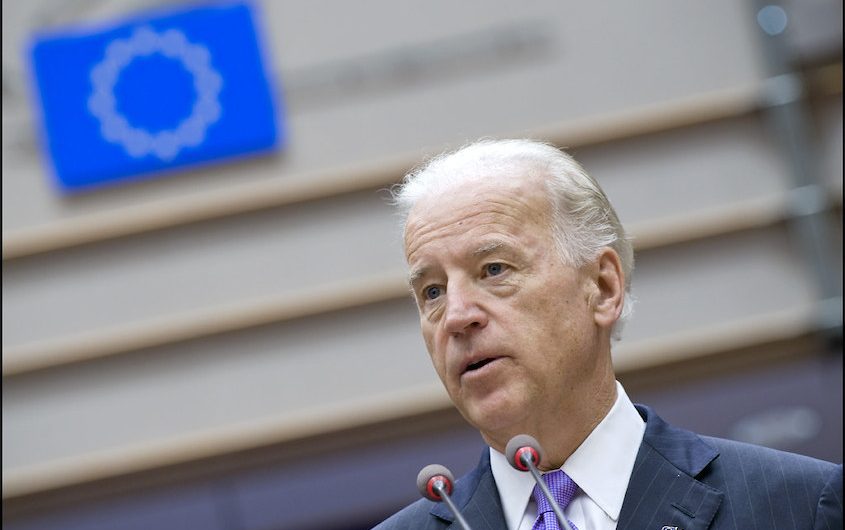
European Parliament via Flickr
USTR’s Promising Start for Transatlantic Economic Relations

Peter S. Rashish
Vice President; Director, Geoeconomics Program
Peter S. Rashish, who counts over 30 years of experience counseling corporations, think tanks, foundations, and international organizations on transatlantic trade and economic strategy, is Vice President and Director of the Geoeconomics Program at AICGS. He also writes The Wider Atlantic blog.
Mr. Rashish has served as Vice President for Europe and Eurasia at the U.S. Chamber of Commerce, where he spearheaded the Chamber’s advocacy ahead of the launch of the Transatlantic Trade and Investment Partnership. Previously, Mr. Rashish was a Senior Advisor for Europe at McLarty Associates, Executive Vice President of the European Institute, and a staff member and consultant at the International Energy Agency, the World Bank, UN Trade and Development, the Atlantic Council, the Bertelsmann Foundation, and the German Marshall Fund.
Mr. Rashish has testified before the House Financial Services Subcommittee on International Monetary Policy and Trade and the House Foreign Affairs Subcommittee on Europe and Eurasia and has advised three U.S. presidential campaigns. He has been a featured speaker at the Munich Security Conference, the Aspen Ideas Festival, and the European Forum Alpbach and is a member of the Board of Directors of the Jean Monnet Institute in Paris and a Senior Advisor to the European Policy Centre in Brussels. His commentaries have been published in The New York Times, the Financial Times, The Wall Street Journal, Foreign Policy, and The National Interest, and he has appeared on PBS, CNBC, CNN, NPR, and the BBC.
He earned a BA from Harvard College and an MPhil in international relations from Oxford University. He speaks French, German, Italian, and Spanish.
On Monday, the Biden administration released the 2021 Trade Policy Agenda and 2020 Annual Report, an annual event that the 1974 U.S. trade act requires take place by March 1. The timing isn’t ideal in year one of a new White House given that the date falls not even half-way into the administration’s first 100 days and – as is the case this time around – the full senior team at the Office of the United States Trade Representative (USTR) is often not in place.
That is one important caveat. Another is that the new administration is still engaged in a review and probable partial overhaul of the U.S. approach to China, including the role that trade policy will play. That means the “trade policy agenda” in the report’s title is an understandable work in progress.
But coming as it does not even two weeks after the European Commission presented a major Trade Policy Review that includes some important common ground with the way Biden team can be expected to formulate China’s challenge to the world trading system, the 2021 Trade Policy Agenda takes on added significance. And in three key areas – climate, supply chains, and the rules-enforcement nexus – there are promising signs for transatlantic economic cooperation.
The trade agenda affirms that the Biden administration “will work with allies and partners that are committed to fighting climate change. This will include exploring and developing market and regulatory approaches to address greenhouse gas emissions in the global trading system.” That language offers a confirmation of the new administration’s commitment to international engagement on climate, including the U.S. return to the Paris Accords.
More noteworthy is the agenda’s suggestion that “as appropriate, and consistent with domestic approaches to reduce U.S. greenhouse gas emissions, this includes consideration of carbon border adjustments.” The European Union is likely to introduce a carbon border adjustment mechanism of its own by the middle of the year as part of its Green Deal. Reconciling trade and climate through a joint U.S.-EU approach to taxing carbon-intensive imports – one that could be expanded to other like-minded economies – would be a major accomplishment for the transatlantic relationship early in Biden’s term.
Reconciling trade and climate through a joint U.S.-EU approach to taxing carbon-intensive imports would be a major accomplishment for the transatlantic relationship early in Biden’s term.
Despite the fact that the administration’s China strategy has yet to be unveiled, USTR promises to “address the widespread human rights abuses of the Chinese Government’s forced labor program that targets the Uyghurs and other ethnic and religious minorities in the Xinjiang Uyghur Autonomous Region and elsewhere in the country. Americans and consumers around the world do not want products made with forced labor on store shelves, and workers should not be disadvantaged by competing with a state sponsored regime of systematic repression.” This commitment to ensuring that supply chains are free of human rights abuses like forced labor reinforces the White House’s recent Executive Order on supply chains and shares the same objective as the EU member states’ call last December for a new EU Action Plan to promote human rights in global supply chains.
USTR’s 2021 trade agenda also stakes out territory for potential transatlantic cooperation in the area of rules and enforcement. The U.S. administration will work with “like-minded trading partners to implement necessary reforms to the WTO’s substantive rules and procedures to address the challenges facing the global trading system.”
But in parallel to action in the multilateral, WTO context, USTR also says that while “unilateral action may be necessary in some instances, President Biden will make it a priority to work with friends and allies on trade enforcement and pursue meaningful change for U.S. workers and businesses in the global trading landscape.”
This assertion suggests the administration may make efforts like the trilateral process with the European Union and Japan, which began under the previous administration and was endorsed by the EU’s trade policy review, its default approach for holding China to account.








